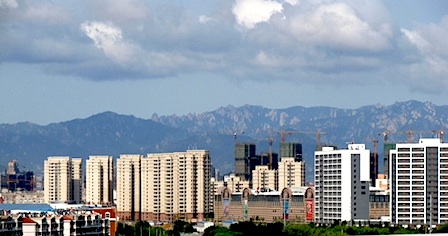
It’s not like the Chinese aren’t listening when President Obama and Mitt Romney accuse them of stealing American jobs, subsidizing exports to the U.S., and cheating on the real value of the yuan.
They hear the critique and they’re annoyed for good reasons.
But if the president and Romney really want to address China as a threat to the U.S., they ought to be talking about a different set of issues, like the resource-wasting, pollution free-for-all that is testing global resources, wrecking the global environment, and threatening public health in and outside China. More on that later, but see this article for Circle of Blue that introduces these ideas in our new project on water, energy, and grain that we started to post this week.
On Chinese indignation: Last month I was the dinner guest of Lei Zhongmin, a professor of economics and environmental management at the Qingdao Institute of Science and Technology. At age 60 Lei is taller than most Chinese men, slim, dark-haired, gracious, and intellectual. He’s taught environmental and energy policy and management for three decades, and is among the institute’s most prominent and respected faculty members.
Lei, though, treated our dinner as an opportunity to lecture an American journalist. His complaint: the distasteful way that China is treated as a scapegoat, a nation to be feared and distrusted, during presidential elections. “Why,” he asked, “do they do that?”
U.S. national political strategy, I tried to explain, has devolved to defining “the other” and demonizing it beyond recognition. China has replaced the Soviet Union as the new metaphor for the primary security threat to the United States. It isn’t nuclear missiles that Americans are encouraged to fear. It’s China’s economic momentum and manufacturing might, the evolving consensus that China will overtake the U.S. in a decade or two and become the world’s largest economy. Instead of applauding, and promoting firmer ties that bind the two countries in a peaceful alliance of trade and diplomacy (which, by the way, is actually happening) leaders of the two U.S. political parties exploit American indignation at China’s fiscal success.
Lei wasn’t satisfied with that answer. He accused the United States of having the maturity of a ten-year-old in dealing with China’s rising global prominence. It’s like a kid storming off the field when he’ s losing and then accusing the other team of cheating.
China, fortunately, is mature and sensible enough to look past what it feels is blatant disrespect from the United States. But there’s a limit, Lei warned, and he predicted that the costs of deteriorating relations will be extreme in the U.S.
China, he argued, has helped the U.S. avoid economic collapse by continuing to hold $1.14 trillion in U.S. treasuries, or more than 10 percent of the national debt. China didn’t steal American manufacturing jobs, he said. Instead China did the U.S. a favor by accepting the big polluting steel, coking, petroleum, and chemical plants that American companies wanted to send offshore to avoid U.S. environmental regulations. “Now we are attacked by America for how much carbon dioxide we put in the air,” he said.
Lei said most Americans have no idea how closely China and American businesses are tied, and that damaging those relationships and investments will hurt U.S. workers. He noted that just a few days before our dinner a Chinese company, Dalian Wanda Group, completed the $2.6 billion purchase of AMC Entertainment, the second largest theater chain in the United States.
China is investing heavily in America’s fossil fuel industry, and its grain storage and transport sectors, helping to grow what are arguably the two most important industrial sectors now in the U.S.
Having downloaded his critique, Lei smiled, welcomed me to his university and toasted my presence with a glass of the city’s famous Tsingtao beer.
Certainly, it’s not pointless for the candidates to raise China as an issue. But their messages ought not to be so lame. China’s a factor in American stability and progress, but not primarily because of the jobs we’ve shipped there or the value of the yuan.
Like an unstoppable wildfire, China is now the world’s undeniable animating force in the international economy and the global environment. Even as it grows bolder and wealthier, China is producing extraordinary stress on its water supply, land, public health, as well as its long-term economic strength. But, unlike Las Vegas, what happens in China with the soaring economic demand and deluge of wastes does not stay in China.
In 2010, the latest year for accurate figures, China accounted for 9.5 percent of global GDP. In order to fuel the economic engine that is now the world’s second largest behind the U.S., China consumed 20 percent of the world’s energy, 51 percent of the iron ore, 47 percent of the steel, 54 percent of the cement, and 60 percent of global soybean exports.
The Earth groans in response. China is now the world’s largest source of carbon emissions, sulfur dioxide emissions, marine coastal pollution. China’s surging demand for fossil fuels is raising global prices for oil, gas, and coal, which, in turn, is helping to finance new water-intensive oil drilling in the deep shales beneath the American Great Plains, land-damaging tar sands oil development in Canada, and water- and land-wasting coal mining and natural gas production in Australia.
China’s treasury and state-owned food companies are investing in a global land rush, buying millions of hectares of temperate farmlands in Africa and South America. Its state-owned power and construction companies are building the biggest hydro-electric dams in the world.
The world is witnessing a run on resources that, arguably, is unmatched by any country, ever. And while China’s 12th and latest five-year plan focuses on water conservation and environmental protection as national priorities, the reality is that Chinese culture – which prizes privacy, rebels against specific directives, and is devoted to GDP growth — impedes the work to secure natural resources.

A thoughtful perspective that ought to be read and absorbed by policy makers.
Another perspective by Tom Watkins is here at Dome Magazine:
http://domemagazine.com/tomwatkins/tw101912-2